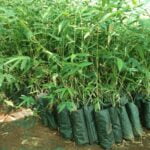Bamboo Farming: The Future of Sustainable Agriculture
Bamboo is a versatile and eco-friendly plant that has been used for centuries for a variety of purposes, from construction to textiles. However, bamboo is now becoming increasingly popular as a crop for farmers who are looking for a sustainable and profitable alternative to traditional agriculture. In this blog, we will explore the benefits of bamboo farming, how to get started, and the future of this exciting industry.
Why Bamboo Farming?
Bamboo is a highly sustainable crop that offers many benefits to farmers. Some of these benefits include:
- Rapid growth: Bamboo is one of the fastest-growing plants on the planet, with some species capable of growing up to 91 cm in a single day. This rapid growth rate means that farmers can harvest their crops and replant them in a short amount of time, leading to a higher yield and greater profits.
- Drought tolerance: Bamboo is highly drought-tolerant, making it an excellent choice for farmers in areas with limited water resources.
- Versatility: Bamboo can be used for a wide range of products, including flooring, furniture, textiles, and even food. This versatility means that farmers can diversify their income streams and sell a range of products from their crops.
- Low maintenance: Bamboo requires very little maintenance, making it an easy and low-cost crop to grow.
Getting Started with Bamboo Farming
If you’re interested in starting a bamboo farm, there are a few key steps you need to take:
- Choose the right species: There are over 1,000 species of bamboo, each with its own unique growth patterns, uses, and environmental requirements. It’s important to choose a species that is well-suited to your local climate and soil conditions.
- Prepare the land: Bamboo needs well-drained soil to thrive. Before planting, you should clear any weeds or debris from the area and amend the soil with compost or other organic matter to improve its fertility.
- Plant your bamboo: Bamboo can be propagated from either seeds or cuttings. Cuttings are the most common method of propagation, as they are faster and more reliable than seeds.
- Care for your bamboo: Bamboo needs regular watering and pruning to keep it healthy and productive. You should also provide it with adequate sunlight and protect it from pests and diseases.
The Future of Bamboo Farming
Bamboo farming is a rapidly growing industry, with demand for bamboo products increasing all over the world. As consumers become more environmentally conscious, the demand for sustainable and eco-friendly products is only going to increase, making bamboo farming an excellent investment for farmers looking to diversify their crops and grow a profitable business.
In conclusion, bamboo farming is a sustainable, versatile, and profitable crop that offers farmers a wealth of benefits. With a low cost of entry and minimal maintenance requirements, it’s an excellent choice for those who are looking to make a positive impact on the environment while growing a successful business. So why not give it a try? Your future as a bamboo farmer could be just a few steps away.
ये भी पढ़ें: Bamboo Farming: बंपर होगी कमाई, खेत के किनारे-किनारे करें ये खेती, हो जाएंगे मालामाल
ये भी पढ़ें: MP के किसानों के लिए बड़ी खुशखबरी, इस खेती के लिए सब्सिडी देगी शिवराज सरकार
For more details visit our website: www.bambooramagro.com





